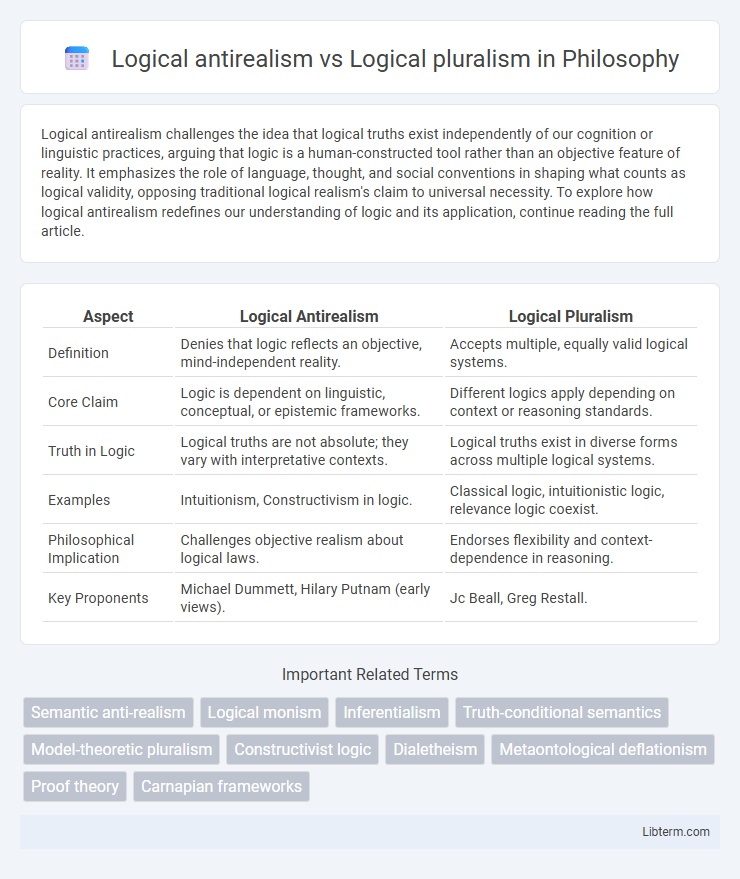Logical antirealism challenges the idea that logical truths exist independently of our cognition or linguistic practices, arguing that logic is a human-constructed tool rather than an objective feature of reality. It emphasizes the role of language, thought, and social conventions in shaping what counts as logical validity, opposing traditional logical realism's claim to universal necessity. To explore how logical antirealism redefines our understanding of logic and its application, continue reading the full article.
Table of Comparison
| Aspect | Logical Antirealism | Logical Pluralism |
|---|---|---|
| Definition | Denies that logic reflects an objective, mind-independent reality. | Accepts multiple, equally valid logical systems. |
| Core Claim | Logic is dependent on linguistic, conceptual, or epistemic frameworks. | Different logics apply depending on context or reasoning standards. |
| Truth in Logic | Logical truths are not absolute; they vary with interpretative contexts. | Logical truths exist in diverse forms across multiple logical systems. |
| Examples | Intuitionism, Constructivism in logic. | Classical logic, intuitionistic logic, relevance logic coexist. |
| Philosophical Implication | Challenges objective realism about logical laws. | Endorses flexibility and context-dependence in reasoning. |
| Key Proponents | Michael Dummett, Hilary Putnam (early views). | Jc Beall, Greg Restall. |
Introduction to Logical Antirealism and Logical Pluralism
Logical antirealism challenges the notion that logic reflects a fixed, objective structure of reality, asserting that logical validity depends on human practices and contexts. Logical pluralism acknowledges multiple legitimate logical systems, arguing that there is no single correct logic but a variety of logics suitable for different purposes. Both positions reframe the understanding of logic, with antirealism emphasizing skepticism about universal logical truths and pluralism embracing diversity in logical frameworks.
Historical Background of Logical Theories
Logical antirealism emerged from early 20th-century debates influenced by intuitionism and constructivism, challenging classical logic's universal validity by emphasizing the role of proof and verification in defining logical truth. Logical pluralism gained prominence in the late 20th century through philosophers like Beall and Restall, who argued that multiple systems of logic, such as classical, intuitionistic, and relevance logic, can simultaneously capture different aspects of reasoning. Both positions trace their roots to foundational disputes about truth, proof, and inference in the development of formal logic during the modern and analytic philosophy eras.
Foundational Concepts: Logic, Truth, and Validity
Logical antirealism challenges the notion that logical truths are independently existing entities, positing instead that logic reflects human cognitive or linguistic practices. Logical pluralism asserts multiple correct logical systems can coexist, each with its own standards of truth and validity depending on different conceptual frameworks. Foundational concepts such as logic, truth, and validity are thus understood variably: antirealism grounds them in epistemic or pragmatic terms, while pluralism embraces a spectrum of legitimate logical interpretations.
Key Philosophers and Their Contributions
Logical antirealism, prominently advocated by Michael Dummett, emphasizes that logic is grounded in linguistic practices and rejects the existence of a single, objective logical truth. In contrast, Charles Parsons and JC Beall champion logical pluralism, arguing that multiple, equally valid logical systems exist depending on context and application. Dummett's focus on verificationism contrasts with Beall's defense of relevance logic and non-classical systems, highlighting foundational disagreements in understanding logic's nature.
Logical Antirealism: Core Principles
Logical antirealism asserts that logical truths are not mind-independent or objectively existing entities but are instead tied to human practices, linguistic frameworks, or cognitive conventions. This position challenges the traditional view that logic reveals metaphysical necessities, emphasizing the context-dependent and revisionary nature of logical systems. Core principles include the rejection of a singular, absolute logic and the acceptance that what counts as valid inference can vary across different conceptual schemes or languages.
Logical Pluralism: Main Tenets
Logical pluralism asserts that multiple, distinct logical systems are equally legitimate frameworks for reasoning, depending on the context and purpose of inquiry. It holds that there is no single "correct" logic but rather a plurality of logics that capture different valid inferential patterns. This view contrasts with logical antirealism, which typically denies that logic accurately describes an objective logical reality, emphasizing instead the variability and context-dependence of logical truths.
Points of Convergence and Divergence
Logical antirealism and logical pluralism converge on rejecting a single, absolute notion of logic, emphasizing instead the contextual or pragmatic factors influencing logical validity. Divergence arises as logical antirealism often denies objective truth-values to logical propositions, whereas logical pluralism accepts multiple correct logical systems coexisting, each valid under different conceptual frameworks. This distinction highlights antirealism's commitment to the epistemic limitations of logic versus pluralism's commitment to semantic diversity in logical reasoning.
Implications for Metaphysics and Epistemology
Logical antirealism challenges the notion of a single, objective logical structure, impacting metaphysical commitments by suggesting reality lacks an inherent logical form. Logical pluralism, advocating multiple coexisting logical systems, expands epistemological frameworks, allowing for diverse reasoning methods tailored to different domains. Both positions reshape metaphysics by questioning absolute logical foundations and influence epistemology by promoting flexible justification criteria and truth evaluation.
Debates and Contemporary Perspectives
Logical antirealism challenges the notion that logic reflects a fixed, mind-independent reality, arguing instead that logical principles are context-dependent or human-constructed. Logical pluralism posits that multiple, equally legitimate logical systems coexist, each capturing different valid forms of reasoning depending on varying conceptual frameworks or domains. Contemporary debates revolve around reconciling these views by examining whether pluralism undermines the objectivity championed by antirealists or if antirealism provides a foundation for the flexibility embraced by pluralists.
Conclusion: Future Directions in Logic Philosophy
Logical antirealism challenges the notion of a single, objective logical truth, emphasizing the role of human conceptual frameworks in determining logical validity. Logical pluralism accepts multiple, equally legitimate logical systems, suggesting that different contexts or purposes justify diverse logical consequences. Future directions in logic philosophy involve exploring the interplay between these views to develop more flexible, context-sensitive frameworks that accommodate varying logical principles without privileging one universal logic.
Logical antirealism Infographic

 libterm.com
libterm.com